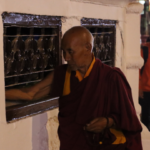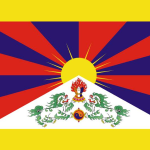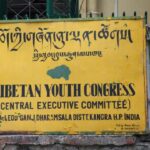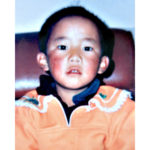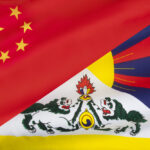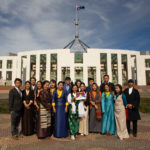Tibetans Storm Delhi’s Chinese Embassy Over COVID Abuses: An Interview With TYC’s Tenzin Dhonden
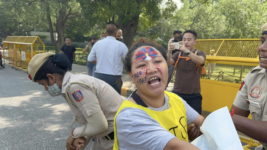
Seventy three members of the Tibetan Youth Congress (TYC) stormed the Chinese Embassy in the Indian capital of Delhi on 1 October to demand that Beijing stop using its Zero COVID policy as a means to further repress those living in occupied Tibet.
Indeed, while Beijing has been running its Zero COVID policy nationwide, it’s been using the restrictions as an excuse to increase repressions upon Tibetans, placing them in huge unsanitary centres, without adequate provision of food or medication, and often without testing them first.
The protesters called out slogans, such as “Free Tibet” and “Enough is enough”. And they were draped in the official flag of the nation of Tibet that used to be freely flown in that country, before the Chinese Communist Party began its annexation of the once independent nation in 1950.
The fact that 73 TYC activists turned up to protest was not by chance, as 1 October this year marked the 73rd anniversary of the founding of the CCP. And the demonstrators were not only raising the COVID issue, but also that Beijing is carrying out a mass Tibetan DNA sample collection program.
Any excuse for a crackdown
The COVID measures being applied in colonised Tibet do not mirror those taking places elsewhere around the nation of China, where, whilst strict measures continue to be maintained, people are being supplied with the provisions that preserve life.
In Tibet, five people have committed suicide due to the conditions they’ve been subjected to.
But whilst it might be shocking that a government is abusing a disease and measures to contain it in such a way as to promote the spread of the potentially killer virus, it’s really no surprise when it comes to the Chinese government’s treatment of the Tibetans.
After 70 years of Chinese occupation, the colonised country of Tibet is today one of the most policed and surveilled regions on the planet. And one of Beijing’s major policies at present is forcing Tibetan children into boarding schools to be taught in Mandarin and to be assimilated into Chinese culture.
An independent and self-determining Tibet
Established in 1970, the Tibetan Youth Congress is the largest Tibetan nongovernment organisation. And to this day, it continues to campaign for the Chinese government to get out of its country completely, so that it can function as an independent democratically run nation.
This, of course, in essence was what the 73 protesters out the front of the Chinese Embassy were calling for last month, right before the Delhi police began dragging them off, placing them in vans and taking them down to the local police station to be charged and detained for a couple of hours.
The nation of India has been accepting of Tibetan refugees ever since they commenced fleeing the takeover of their nation back in the 1950s. And even Indian law enforcement authorities are sympathetic to the Tibetan plight.
Sydney Criminal Lawyers sat down and spoke to TYC Delhi chapter secretary Tenzin Dhonden and its president Tashi Nyima in their office in the Delhi suburb of Majnu Ka Tilla about their recent protest action and why independence is the only way forward for Tibet.
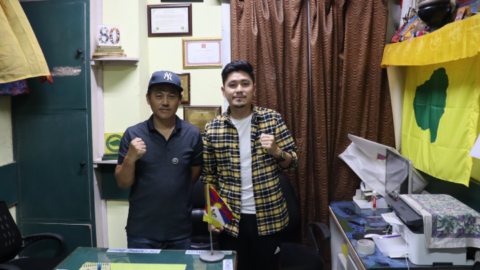
The Chinese government’s strict approach to the pandemic is well known. And while the rest of the world is now living with the virus, it’s still holds a Zero COVID policy.
However, when it comes to Tibet, the authorities are taking the opportunity afforded by this policy to further crackdown upon the local people.
In what way is the CCP applying pandemic measures upon Tibetan communities in a more extreme manner than compared to that of other populations? And how would you describe its impact?
Tenzin Dhonden: On 1 October, the 73rd anniversary of China’s national day, 73 protesters marched on the Chinese embassy in Delhi condemning their Zero COVID policy, which is a policy by the Chinese Communist Party, where they plan to completely eradicate the COVID virus in Tibet and in China by any means necessary.
So, when I say any means necessary, they’re not giving proper medical care to the Tibetan people or giving proper food to the Tibetans who are suffering or showing any signs of flu-type symptoms.
If you have someone with a flu-type symptom, they don’t even do a proper COVID test, they just isolate them and send them into detention to separate them. Children, teenagers and sometimes the parents of children are separated from their families.
And suppose you have a house, where you have some flu-type symptoms, they just lock the door on everyone, telling the people it’s COVID containment.
So, in a way, they’re suffering a lot.
We have heard news from Tibetans, through our correspondence and through Tibetan news that five Tibetans have suicided because of this. One report showed a Tibetan jumping off a building.
These are very tough times. So, in order to condemn the Chinese government over their Zero COVID policy, we marched on this protest.
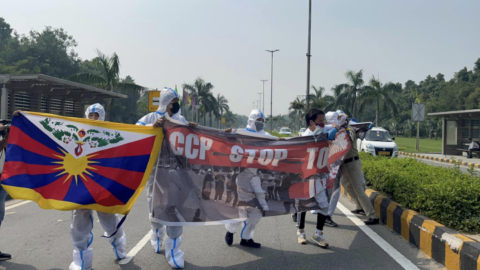
So, the way the CCP is treating people in Tibet around COVID is different from the way they’re implementing the Zero COVID policy in, say, Beijing?
Yeah. It’s true. Even though they call Tibet a part of China, there’s no way that the Chinese consider Tibetan people as themselves. There is always racial discrimination, especially of Tibetans in the Tibetan Autonomous Region area.
They’re not giving proper care, proper testing, proper food or a proper place for a COVID containment zone. They’re just putting these people in an animal shed and calling it a containment zone.
But in Chinese areas, they’re given proper tests. Testing is done before they’re put into containment zones.
They’re given proper food and proper sanitation. There is a huge difference and huge discrimination in what’s going on in Tibet.
On 1 October, members of the Delhi chapter of the Tibetan Youth Congress stormed the front of the Chinese Embassy in Delhi to highlight the recent COVID repressions, and, as you said, this further coincided with the 73rd anniversary of the founding of the Chinese Communist Party.
What took place during the demonstration and how did the local authorities respond?
Seventy three protesters demonstrated. We protested the Zero COVID policy.
We went in front of the Chinese embassy, and shouted slogans, such as, “Stop torturing Tibetans under the guise of free COVID”.
And then we were condemning the huge news that the Chinese are mass collecting DNA samples of Tibetans without their consent.
This is against human rights law, and the basic laws of Tibetans.
So, we were condemning the Chinese policy, condemning the Chinese oppression and we were highlighting the issue to the wider community to let them know the Chinese policies that are happening in Tibet.
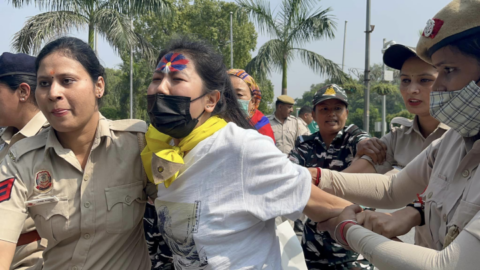
COVID restriction repressions are only the most recent in a series of atrocities and genocidal acts the CCP has been perpetrating against Tibetans in their own country.
Can you elaborate on what some of these broader atrocities have entailed?
Ever since the Chinese annexation of Tibet in 1950, China has killed more than 1.2 million Tibetans. And these numbers could be even more. These are just the known numbers.
Eight thousand Tibetan monasteries have been demolished, and still this process is going on.
Of late, there have been 159 Tibetans who have self-immolated. They have burnt themselves alive to protest against Chinese oppression.
These are not just numbers. These are 159 human lives. And they’ve burnt themselves alive to protest against Chinese oppression and to let the world know that the Tibetan people are suffering inside Tibet.
So, we should definitely pay attention to these people.
These days, there is also what’s happening in Xinjiang. There are mass detentions and camps involving the Uyghur people.
What we’re saying is that this is just a repeat of history. What’s happening inside Xinjiang, is what has been happening inside Tibet since 1950.
So, we want the people of the world to know it is not just Xinjiang. China is not just a threat to the values of democracy. China is a threat to global peace and global order.
So, we need to call out the wrongdoing in Tibet, in Xinjiang, in southern Mongolia, in Hong Kong and in Taiwan.
We need to point that out together and let them know that their hegemony will not be taken lightly anymore.
Is the situation getting worse in Tibet?
It’s getting worse, day-by-day. As we speak there is the 20th National Chinese Communist Party meeting going on. So, it’s almost sure that Xi Jinping is going to get another term as president.
If you talk about the constitution of the Chinese Communist Party, a party leader cannot hold the position for more than two terms.
But Xi is following in the footsteps of Mao Zedong: the founder of the CCP. He was the last person to hold the chair of China until his death.
And now Xi Jinping is following in his footsteps. So, in the last 10 years of Xi Jinping s rule, he’s launched expansionist policies in order to capture integral places in parts of India, like a whole part of Uttar Pradesh, part of Assam, part of Ladakh and part of Jammu Kashmir.
So, this is part of his expansionist activity. And then there is the Galwan Valley faceoff between the Indian Border Force and the Chinese Border Force.
Twelve Indian Border Force troops have died. And although the Chinese have tried to claim that no Chinese Border Force troops have died, there have been 6 to 10 people that have died.
Then there was the Doklum issue, where they’re trying to push into the Bhutanese area.
There was this faceoff at the Doklum area, where there is this three-way spot, where the border of Bhutan, the Chinese border and the Indian border meet. So, Indian security forces provided support to the border.
There is also this predatory loan mechanism, where China is providing huge loans to Sri Lanka and to countries in Africa, where they cannot repay the debt. And when they cannot repay the debt, China takes a whole area, or in the case of Sri Lanka, a whole port.
Sri Lanka had to give the whole port to China. So, in a way they’re forming their own naval area there. And then there was even one African country, where they provided huge loans and it can’t repay, so China now owns the only airport in that country.
Then we have the Belt and Road Initiative, where they’re telling all the people of the countries that they’re interconnecting them, when in fact they want to make their presence known, and they want to make a straight way for the Chinese military.
Then we have the South China Sea issue, where they’re claiming the South China Sea is theirs, when in fact, it has always been an area of free and fair passage for any country wanting to do business.
Then we have Hong Kong where they are thrashing the democratic people: the people calling for democracy. And they introduced an extradition law, where they now have the power to take on any people who want to take on China and bring them to the mainland, and then torture them as well.
Then we have this Taiwan issue, where Xi recently claimed that they’re going to reunify Taiwan to the Chinese mainland by any means necessary, and if any other country in any way tries to interfere, they’ll be met with severe means.
So, these are all Xi’s legacies for the last ten years, and if we get another term, we are sure he will follow all those pursuits in further directions – his expansionist policies, his threats to democracy – these are all going to keep on.
And the Tibetan issue is also there.
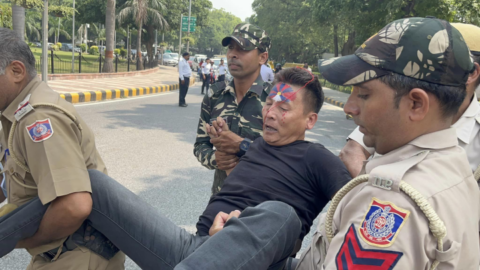
India has been very welcoming to Tibetan refugees over the last seven decades. Considering this, how do the authorities deal with Tibetan activists when taking actions in India against Beijing, as you did a few weeks back?
Our group always calls India a guru, because in a way, our Buddhism came from India and then spread across the Tibetan plateau. So, ever since Tibetans had to flee from Tibet to India, India has been a home away from home.
They have given us land to stay. A place to study. A place to promote and preserve our own culture and tradition, so we are very thankful to India.
Regarding the protesting part, we have to ask permission before protesting in front of the Chinese embassy or in any public area, so when we go for the permission, they’re more than willing to give us the permission.
And when we go to the protest, the Indian Police Force detain us. They detain us in the Indian police station and then we are released after three or four hours. That is the whole process. They don’t imprison us, because they know our freedom.
So, there will be no charges or court appearances?
There will be court appearances. But we will not be imprisoned. There will be charges. We will have to keep going to court hearings. But, in a way, you can call it a process.
So, due to the COVID protest, you will be going to court. Will you get fined?
Not fined, but our case will be going on.
We will have to go to a court hearing, where we have to show our presence and our lawyer will take over the case motion, and the case will keep going on but after it will be closed.
There is a sizable community of Tibetans living in Majnu Ka Tilla in Delhi. How is life for them living in this city?
Tibetans in Delhi have a comfortable lifestyle. As you can see, ever since the Delhi administration announced that Majnu Ka Tilla is a food hub, local shops, local businesses and the community has been thriving. It has been booming.
So, we are blessed that Tibetans are having a good lifestyle, but all Tibetans always feel that however comfortable you feel, you should never forget your main goal, why you became a refugee in the first place, and that was not to fight for your own comfortable life.
Tibetans are having a comfortable life here now, but was it always comfortable?
No. When our forefathers first came from the plateau of Tibet, they were road constructors.
They were constructing roads in Himachal Pradesh, hilly areas, where there weren’t well connected routes.
So, our forefathers started working in the road construction areas and then other daily jobs, like house construction, and that’s how they climbed the ladder of life. And now we have a good area to live in here.
Do Tibetans have the same sort of rights as other Indian citizens? What is the legal status of Tibetans?
The political term for Tibetans is still refugees. So, if you live in a country and you are a citizen of the country you have the same rights, duties and freedoms of any citizen of the country.
Since we Tibetans are not citizens of India, we still don’t have the same rights. So, for instance, we still can’t apply for any government jobs. We cannot buy or sell any land.
So, we don’t have the same rights, but the Indian government has been kind enough and gracious enough to give us our own place to have our shops, do our business, to promote our culture and language, to have our own monasteries and to have our own schools.
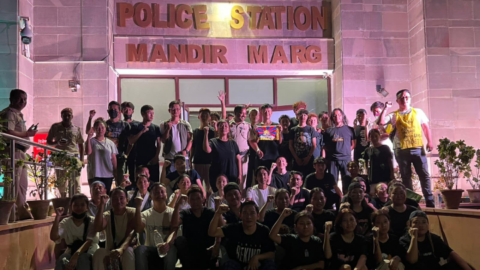
The Tibetan Youth Congress was established in 1970. Over the years, its aim now differs from that of the Central Tibetan Administration, as your group still prioritises full independence for Tibetans in their own country.
Why does full independence remain the TYC end goal? Why isn’t the middle way approach of the Central Tibetan Administration enough as far as the youth congress is concerned?
For that, we’ll have to go back for a bit of historical reference. When China annexed Tibet and the Tibetans fled into India, our goal was always independence.
In fact, when the Tibetan Youth Congress was first formed in the year 1970, His Holiness himself blessed us with a speech and his presence. And he claimed that we should do whatever we can.
But going onto the 1990s, when the Tibetan movement started getting less attention but also becoming more innovative, His Holiness thought of the middle way approach and then he changed the policy of the Central Tibetan Administration, so that people voted.
But the TYC had been formed before the middle way approach came and was founded by our first-generation Tibetans, who had faced Chinese atrocities. So, they had a deep resentment to China, and also felt freedom is everyone’s birthright. So, keeping that in mind, we are still pushing for the complete independence of Tibet.
Having said that, we wholeheartedly respect His Holiness and the CTA point. But we feel that the main wisdom of His Holiness on the Tibet issue is a well-functioning, smooth-running democracy, and in any democracy, there is not just one policy or just one voice.
In a perfectly working democracy, there should be differences of opinion, voice and policy. We feel we are one of those differences of policy.
So, for a healthy, functioning, smooth-running democracy, there should be different views and different policies. So, we are part of that democracy.
We in no way feel that we are disrespecting or not following His Holiness. We deeply respect him. It’s just that our viewpoints are different.
You should talk to any Tibetan who has faced the Chinese atrocities. What they feel is that we have faced a lot of Chinese torture and we don’t want them to stay. That is deep down their voice.
But because of the huge reverence for His Holiness, in a way, they model the CTA viewpoint. So, we don’t blame them. It is just a different viewpoint. And everyone should agree to disagree.
And lastly, it’s been over seven decades, since the CCP invaded your country and the Tibetan Delhi community is well-established.
So, generally speaking, do Tibetans living here expect that their people will return to Tibet once more?
Of course, we all expect and are hoping to go back as soon as possible. The greatest example of this is His Holiness himself, as he is 87 years young, and still always says that he will get to go back to his Tibet.
So, if he is that optimistic, if he is that hopeful, how can we not be? So, we are very hopeful. The change is there.
Last Thursday, five days before the Chinese Communist Party meeting, there was one Chinese man who protested in Beijing with a banner that said there should be “No More Xi”, “No More Tests”, We Want Food” and “We Want Democracy”.
There are voices there right now but because of Chinese torture and danger, they’re afraid to speak out, and they just need a catalyst. Things like that will slowly come on, because democracy is the way forward. Communism will not hold forever.
Also, our president who has been working with TYC for the last 20 years would like to add something about the TYC and CTA difference:
Tashi Nyima: His Holiness’ position and the TYC stance are different, but His Holiness has never stopped us from doing what we are doing.
In fact, he has given us special meetings and told us to do what we are doing because we are not wrong, we have to fight for our freedom.
So, our vision is different, our goal is different, but we are not wrong. That is what he said.
Most of the younger generation are seeking full independence. The older generation are following in the footsteps of His Holiness.


